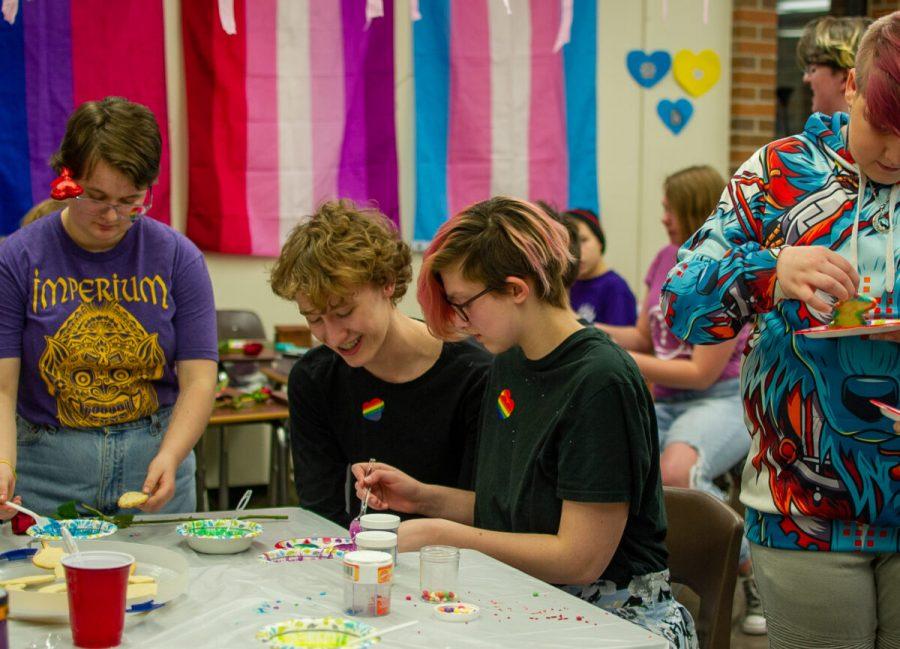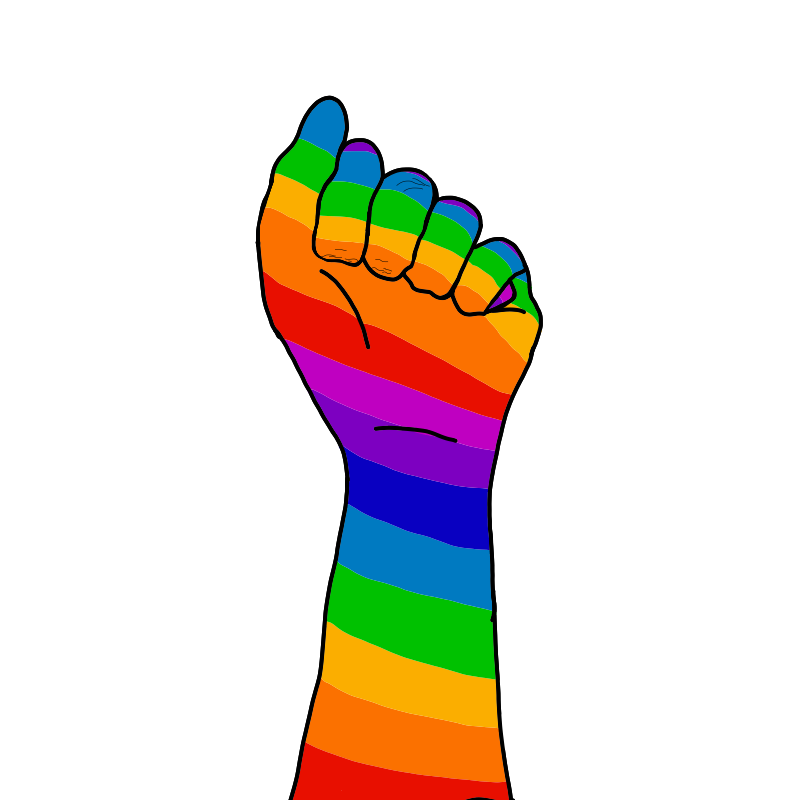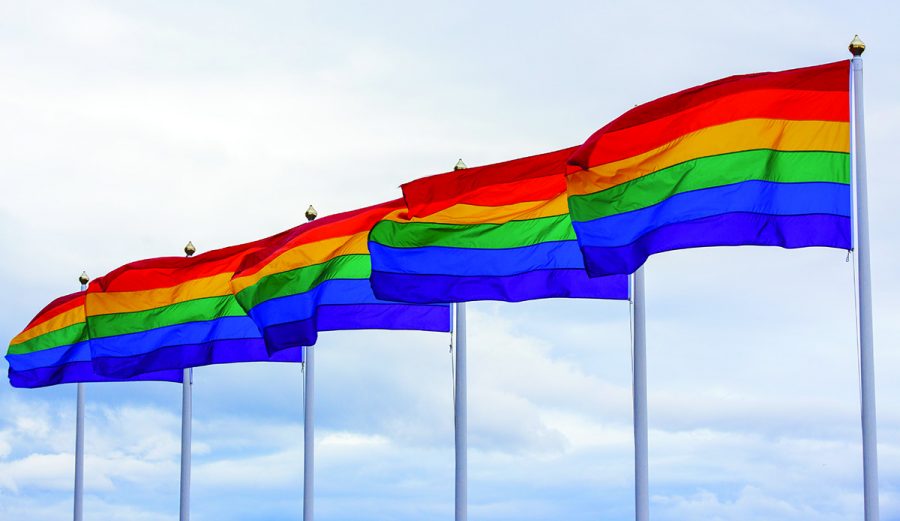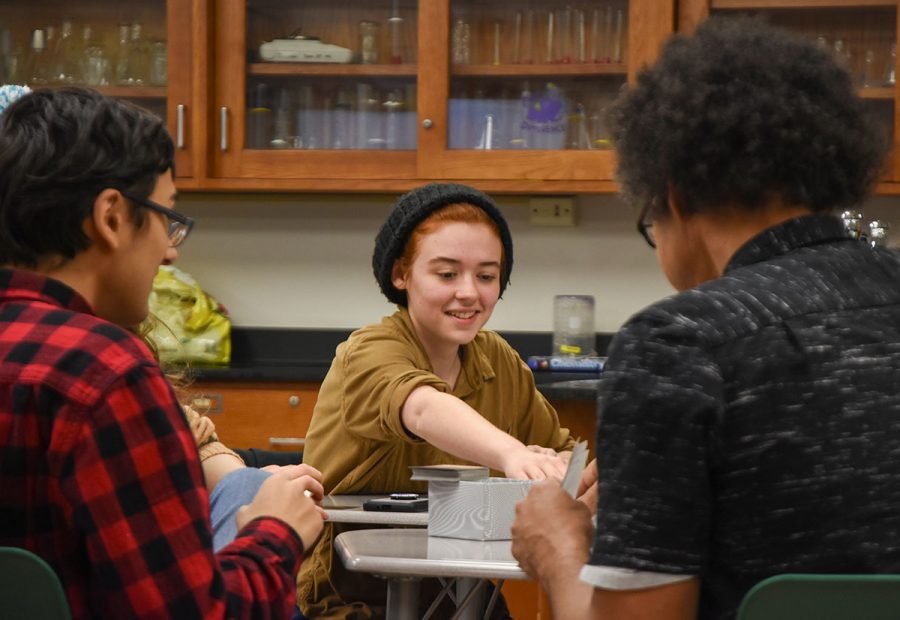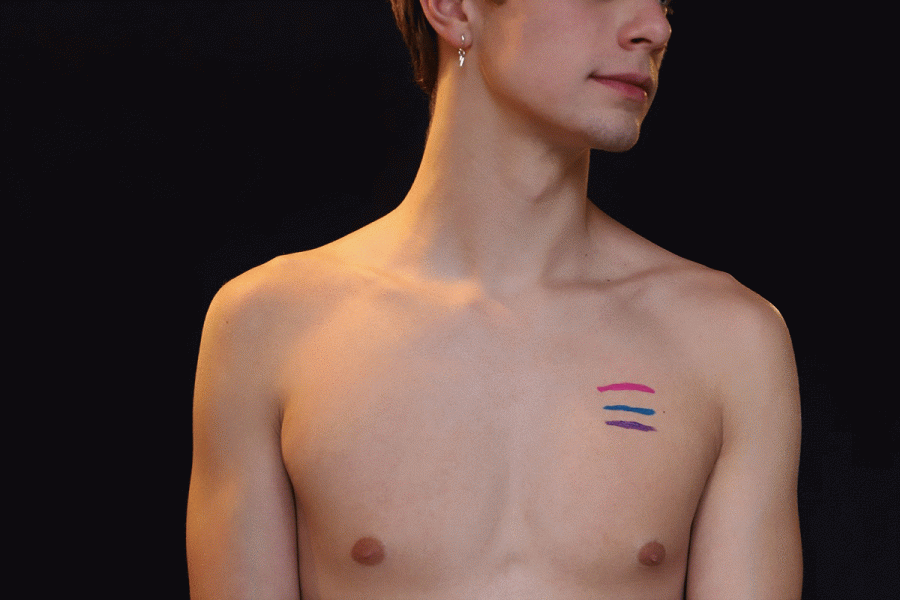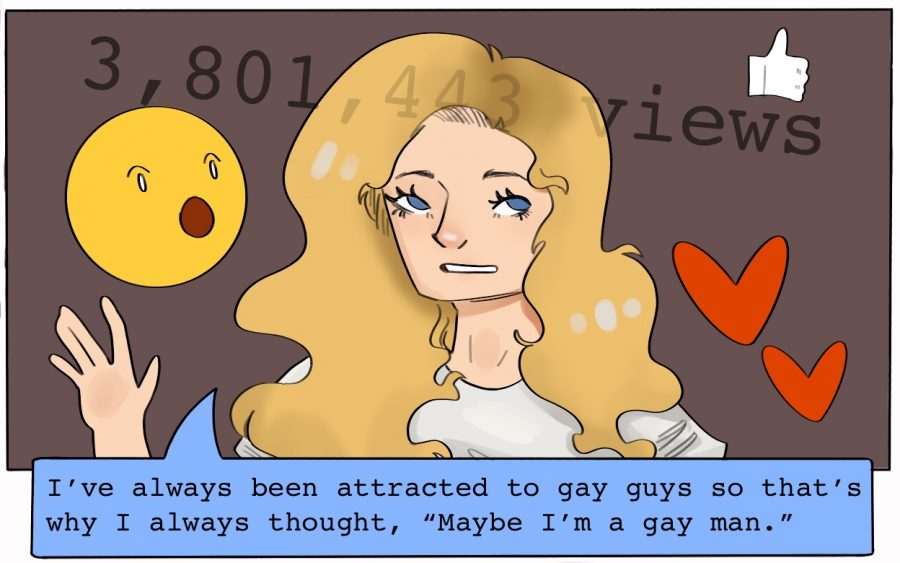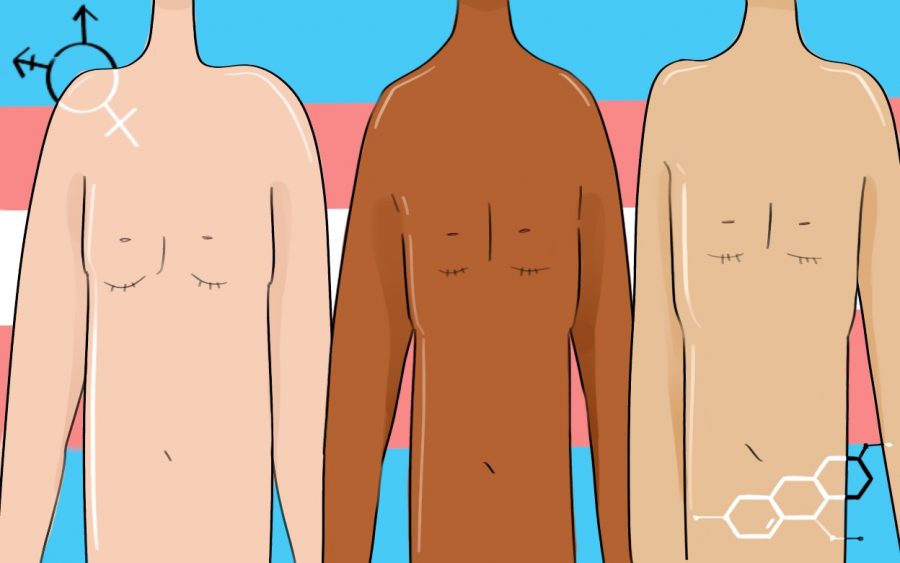After school Tuesday, Feb. 11, RBHS’ Gay-Straight Alliance (GSA) hosted its second annual RBHS Valentine’s Day party with students from three Columbia Public Schools (CPS) high schools and some middle schools in attendance.
Co-leader senior Finion Crowder, who uses they/them pronouns, said the group decided to start this tradition last year since Battle High School has the Pride Prom and Hickman High School (HHS) holds a Halloween party. The event included cookie decorating, a variation on pin the tail (pin the arrow), bingo, a drag show and other activities.
“The biggest goal with planning was trying to get as much as possible of what everyone wanted from the party, so we started with a list of our dream party and narrowed it down to what we could realistically do,” Crowder said. “We also had many members of GSA sign up to bring food and supplies for the activities we had, which without we wouldn’t have had as great of a party as we did. [In] the end, it’s a party for them, so my main goal with planning was making it so they would enjoy their time.”
As much as Crowder tried to over prepare, however, they said they never seem to get enough supplies and “had a couple of mess ups.” Nevertheless, as students moved around the room listening to music like Katy Perry’s “Part of Me,” the atmosphere was relaxed; streamers hung from the ceiling, flags brightening up the walls and a wide array of snacks for all. Junior Toné Johnson said it was nice to be able to socialize with students he barely gets to talk to or spend time with during the regular school day.
“We’re having a Valentine’s party with all the genders,” Johnson said. “We’re gonna have a little drag show, which I think is amazing, letting people be who they want to be. We’re just hanging out.”
Creating safe, welcoming spaces where LGBTQ people can openly express their sexual orientations and gender identities is “especially [important] for youth,” Crowder said, because “a lot of LGBT hangout centers are clubs or bars” or drag performances, the majority of which are at night and restricted to people who are 18 years of age or older. For this reason, Crowder aimed to create a place where middle and high school aged community members could “have fun and be safe.”
“Most kids in the LGBT community know what it’s like to be judged and/or bullied and harassed for expressing their true selves, so most everyone in the GSA knows how hurtful it is. So, it creates an open and welcoming and accepting space,” Crowder said. “While everyone in the group likes to throw out jokes occasionally, at the end of the day, we’re all there for each other.”
LGBTQ acceptance among Americans ages 18-34 on the decline
Although acceptance for LGBTQ people may be strong within GSA, the non-governmental organization Gay and Lesbian Advocates and Defenders’ (GLAAD) 2019 Accelerating Acceptance results showed a further decline in LGBTQ acceptance among Americans ages 18-34 as of June 24, 2019. Nevertheless, the same GLAAD report found for the third year in a row, eight out of every 10 Americans support equal rights for LGBTQ people.
“We’re not accepted a lot of times. Like heck, I miss pronouns all the time,” Johnson said. “I think it’s nice for all the gays, lesbians, trans, whatever else there is, everything. We accept everything in this club.”
The party provided LGBTQ students with a space to be together, Hickman High School (HHS) junior Harvey Hanson, who uses they/them pronouns, said. For them, it was easy to attend because it was at school. Hanson said they had “just kind of been chilling,” and they thought the setup, activities and people were all nice. Hanson said some people from the RBHS GSA and their Dungeons & Dragons group initially invited them, but after hearing an announcement for the party again at a recent HHS GSA meeting, Hanson decided to attend.
“I was like, ‘Well, I might as well come because it seems like a good time,’” Hanson said. “We can hang out with people like us, especially like the GSA events. Like, we have a chance to meet kids from other schools and the middle schools, which is really fun.”[/vc_column_inner][/vc_row_inner]
The paper heart decorating contest was one of the party’s most popular events, Crowder said. It amassed numerous submissions, and its table attracted the most people. A continued hit from the previous year was the “pin the arrow on the bow” competition. Senior Emery Wakefield, who uses they/them pronouns and is a co-leader of the RBHS GSA, said their favorite event from the party was the drag performances that happened at the end of the night.[/vc_column_inner][/vc_column_inner][/vc_row_inner]“Seeing people step outside of their comfort zones in a supportive environment in the form of drag was really special; additionally, seeing kids from the middle schools that visited confident enough to perform was really meaningful to me because when I was that age there weren’t GSAs or many opportunities for me to express myself.”
GSA provides platform for free expression, authentic connection
Fun and games aside, Crowder said they thought everyone enjoyed being in a space where all people in attendance could have fun with peers and express themselves honestly, without fear of judgement. Wakefield and junior Rowan Schul both expressed that one of the most gratifying parts of the event was having an opportunity to connect with students from other schools’ GSAs.
“My favorite part of the party was that it brought not only the other high schools together, but we extended the invention to the middle school GSAs. Because of this, we had many students from the other high schools as well as students from the middle schools,” Schul said. “This helps build a community in the CPS GSAs and shows the middle schoolers that they will have a place when [they] get to high school.”[/vc_column_inner][/vc_row_inner][/vc_column_inner]
Schul said she first wanted to join GSA because while her family and friends are “very accepting” of her and the LGBTQ community, she was interested in finding people who may [/vc_column_inner][/vc_row_inner]have a deeper understanding of certain topics and had shared similar experiences to her. She said her experiences with GSA have been positive, and “no one there judges anyone for who they are, who they identify as.”
“We strive to create a [safe] space for everyone to be fully themselves without judgment,” Schul said, “and I think that’s partly [what] makes it so great.
LGBTQ advocacy groups continue fight for equality, justice
GSAs across the nation fight for educational justice, empower students to push for LGBTQ education in schools and communities and “advocate for just policies that protect LGBTQ youth from harassment and violence,” according to gsanetwork.org. Having come out the summer before entering high school, Wakefield said they first decided to join GSA during their freshman year as a way to “branch out and connect to other people that could offer support.” They said they were immensely nervous at first but were ultimately able to meet “so many wonderful people” and learn about the LGBTQ community and LGBTQ history through GSA meetings.
“Now that I’m a senior in high school and one of the co-leaders of the GSA, I’m serving the role of looking out for the younger students that are just now coming out and figuring out who they are, and offering my support,” Wakefield said. “I’ve learned and grown a lot through GSA, and it’s been a real honor attending meetings over the years.”
Seeing the genuine smiles on people’s faces, Crowder said, was one of the most heartwarming parts of the Valentine’s celebration. They said people were not “worried about other things. They were just enjoying themselves at the party.” Crowder said one of the goals they hoped to achieve was “seeing everyone leave the night with a smile.”
As welcome a reprieve from the normal daily drudgery as the event was, Crowder said GSA members have expressed a common concern about the jokes regarding LGBTQ people and lack of education surrounding the LGBTQ community within the student bodies and curriculum of CPS.
“While GSA strives to educate the school, not everyone can make it, so a lot of members have discussed integrating LGBT education and history into regular curriculum as it’s really important for younger LGBT people to hear about people like them who they can look up to as role models,” Crowder said. “There’s also a large complaint of offhanded comments and jokes about LGBT people.”
Crowder said a few years back a common joke was “I identify as an attack helicopter,” which, while they said it may have seemed harmless to some, can truly hurt members of the LGBTQ community. Likewise, they said numerous current members have complained about hearing students use the word “gay” in improper or hurtful ways, such as saying it to express annoyance or disappointment.
“I think the easiest thing to do is listen. [Listen] to when we say something and don’t dismiss us. Don’t look down on us,” Crowder said. “If they say some comment you say is rude or offended them, realize that it did, and don’t make some excuse about how it wasn’t meant or it was a joke. I think people should do that more in general to everyone.”
All too often Schul said she hears people making jokes with negative connotations about their friends being gay. She said such quips can affect “how people think about themselves and others around them.” By actively calling out the perpetrators of such behaviors, Schul said students and teachers alike can help to create a more inclusive environment where everyone feels safe. In addition to harsh in-school remarks, Schul said it is difficult for one to find LGBTQ relationships in general, much less healthy ones, in mass media and popular culture, which for her is one of the reasons why GSA’s lessons on all aspects of healthy LGBTQ relationships are so necessary.
“While it’s important to learn how to be safe and form healthy relationships, those relationships should also be celebrated much like their non-LGBTQ counterparts are at this time of year,” Schul said. “The more we normalize celebrating healthy LGBTQ relationships in media, pop culture and around us, the easier it will be for the younger generations to navigate through life and relationships.”
GSA Valentine’s Day celebrations generate positive LGBTQ representation
Various media outlets have produced films and television shows centered around or featuring LGBTQ relationships, such as the upcoming Freeform movie, “The Thing About Harry,” and the 2018-2019 GLAAD report “Where We Are on TV” found 8.8% of series regulars on broadcast television in the 2018-19 season are lesbian, gay, bisexual, transgender or queer characters, a record high since GLAADs reporting expanded to count all broadcast series regulars 14 years ago,” according to a New York Times article.
A holiday society now securely roots in celebrating love and romance, Valentine’s Day originated as a pagan festival in February, later transitioning to center around St. Valentine who was a martyr in the Catholic Church and eventually evolving to include the assorted red, white and pink paraphernalia and chocolates of the modern day. Since the holiday’s name stems from a saint who was executed and martyred for secretly marrying people who society forbade to wed, Wakefield said historically they feel as if Valentine’s Day has “some degree of similarities and importance to the LGBT community.”
Part of being LGBTQ means realizing not everyone will be OK with who one is or loves, Wakefield said. As of Oct. 28, 2019, the Pew Research Center reported 30 countries around the world have legalized same-sex marriage, yet there are still parts of the world where LGBTQ people face extreme discrimination and cannot be legally married, according to the Human Rights Watch’s 2019 country profiles for sexual orientation and gender identity.
Nevertheless, “being able to openly celebrate Valentine’s Day — and love in general — has been incredibly freeing. It’s still disheartening to know that outside of Columbia, and the U.S in general, opinions on LGBT people are not as positive,” Wakefield said, “and therefore being able to celebrate Valentine’s Day shouldn’t be taken for granted.”
Echoing Wakefield’s sentiment, Crowder said they think RBHS is far more accepting of LGBTQ people than other schools around the country, or even in Missouri. Crowder said, however, this doesn’t mean students, teachers, administrators and the school in general cannot continue to improve.
“We are human,” Crowder said, “and who we love or how we identify doesn’t change that.”
How do you plan to celebrate Valentine’s Day with the ones you love? Let us know in the comments below.












































































